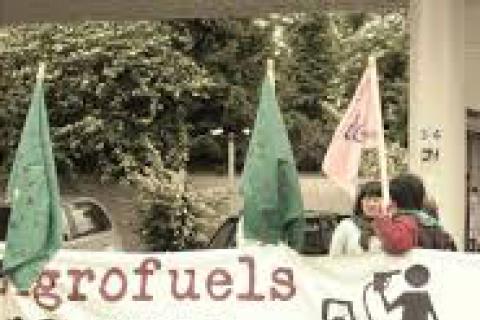Members of twenty-five Indonesian NGOs and community organisations met in Riau, Sumatra, on 13th January 2007, to give voice to their serious concerns about the impacts of the pulp and paper industry and its fastwood plantations on people and forests.
Other information
The web page http://www.southafrica.info, published for the International Marketing Council of South Africa, included in March an article which stated that “South Africa has identified the Eastern Cape and KwaZulu-Natal provinces as key for development in the forestry, wood and paper sector, with reforestation a vital part of the strategy”. For those who don’t know the forestry language, it is important to note that in South Africa the word “reforestation” really means planting vast monocultures of alien tree species on native grassland ecosystems.
Advance Agro is one of Thailand's largest pulp and paper companies, producing 427,000 tonnes of pulp and 470,000 tonnes of paper a year. The company markets its "Double A" brand of photocopy paper with a series of environmental claims. In May 2007, an Australian company called Access Economics added to these claims with a report titled "Environmental Benefits of Double A Paper".
The entrance to the bank has nothing to do with human scale. Built of steel and glass, the building towers over visitors like a spotlessly cleaned, giant machine. A machine for swallowing people and making money, perhaps.
Fiske Menuco (General Roca), (see footnote)*
The struggle between two agricultural projects has stepped up in Brazil. On the one hand, the agro-business project based on the concentration of vast stretches of land, on production for export, on large-scale production and on monoculture plantations, mainly of soybean, eucalyptus, and sugar cane.
At the end of April this year, the Brazilian Rural Landless Workers Movement (MST) was host at its Florestan Fernandes National School (Guararema, Sao Paulo) to almost 80 members of social movements and organizations from South America, Asia, Africa, and Europe attending the International Meeting on Monoculture Eucalyptus Plantations. The aim of this meeting was to define an agenda for joint action against the advance of monoculture tree plantations and pulp mills at global Southern level.
The Thai government has set its policy on producing palm oil-based biodiesel as energy. At present, the country’s large-scale oil palm harvest areas account to around 400,000 hectares, but since 2006, a discourse on oil palm has emerged to promote its plantation as a “renewable source of energy”, a “country savior”, a “reforestation scheme”, a “wind-protection zone”, and a “transformation of deserted rice fields into palm fields”.
The promotion of large-scale fast-growing monoculture tree plantations started in Uruguay in 1987, with forestry law Nº 15939 of December 1987. Today these plantations occupy over one million hectares of land and not only lands in the “forestry priority” category.
The US South Carolina-based company ArborGen is a partnership between the timber corporations International Paper and Mead Westvaco, and the New Zealand-based Genesis Research and Development. ArborGen has been growing GE Eucalyptus hybrid trees and testing them for cold tolerance on a secret 1-acre plot in Baldwin County, Alabama, close to the Gulf Coast of Mexico. The place was found to be home to a number of experimental, genetically modified crops, many of which appear to be growing on a Loxley farm owned by agricultural giant Monsanto Co.
WRM has created a new video section in its website. You can find it in the page’s left column or going directly to http://www.wrm.org.uy/Videos/index.html.
The Congo rainforests of central Africa are, after the Amazon, the second largest rainforest on Earth and a major biodiversity hotspot: Two-thirds of the forest lies in the Democratic Republic of Congo (DRC) -- still divided by a vicious civil war fuelled by competition for control over natural resources, and that claimed 3.5 million lives. About 40 million people of DRC depend on the rainforests for their very survival.

